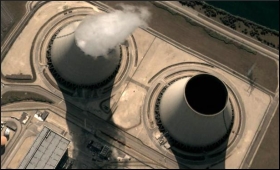|

|
N-operator liability capped at $64 million in draft bill
|
|

|
|
| Top Stories |
 |
|
|
|
Devirupa Mitra | 21 Dec, 2009
In a controversial move, India has capped the legal responsibility for an operator of a nuclear installation to settle damages for any accident at just Rs.300 crore ($64.2 million) in a draft legislation that is likely to get a stormy reception in parliament.
The passage of a civil nuclear liability bill is one of last steps in implementation of the landmark US-India civil nuclear agreement. The text was approved by the cabinet Nov 20 and it is expected to be tabled in parliament in the next session.
A copy of the draft Civil Liability for Nuclear Damage Bill 2009 bill, which is yet to be made public.
It stipulates in Chapter 2, section 6, that while the "maximum amount of liability in respect of each nuclear incident" shall be Rs.2,208 crore (300 million special drawing rights or $471.38 million), the operator's legal responsibility for damages is capped Rs.300 crore. If the operator liability exceeds Rs.300 crore, then the central government will have to pay the rest of it, noted the subsequent section in the bill.
It added that while the government could increase or decrease this operator liability by notification "having regard to the extent of risk involved in a nuclear installation", the amount of liability could not be less than Rs.100 crore.
The exceptions listed for an operator not to be liable was when a 'nuclear incident' was caused by grave national disaster of "exceptional character", armed conflict or act of terrorism and suffered by person on account of his own negligence.
The thorny issue of capping liability has already got vocal critics. Greenpeace India commissioned former Attorney General Soli Sorabjee for his opinion, who said that there was "no warrant or justification for capping nuclear liability".
"Any such move will be in defiance of Supreme Court judgments and will be contrary to the interest of people of India and their fundamental rights under Article 21 of the constitution," he said.
On Friday, Communist Party of India-Marxist (CPI-M) general secretary Prakash Karat said in Kolkata that all political parties must oppose the civil nuclear liability bill - echoing his earlier stormy opposition to the US India nuclear deal.
Currently, the Atomic Energy Act 1962 only allows the state-run Nuclear Power Corp India Ltd to operate nuclear power plants in the country. After the Nuclear Suppliers Group's September 2008 decision to allow India into the international nuclear trade, the country set an ambitious target of increasing installed capacity of nuclear power by 60,000 MW by 2030.
While foreign firms will not be allowed to operate plants till the law is changed, foreign suppliers of technology and services are rushing to grab a slice of the multi-billion dollar Indian nuclear market.
Despite the US authoring the move to bring India out from nuclear isolation, American firms have fallen behind in beginning work, compared to Russian and French companies. The bilateral agreements with Russia and France have clauses on liability in case of any accidents, which have allowed public sector Rosatom and Areva an early start in India.
But the large private American companies, GE-Hitachi and Westinghouse, are still waiting in the wings - though India has already announced two sites in Gujarat and Andhra Pradesh to build 10,000 MW nuclear complexes.
The reason is that a few more steps have to be completed. While both countries have to conclude negotiations on a bilateral fuel reprocessing pact - which still has some gaps, and decide on US demand for specific guarantees of non-proliferation of exported technology, India had to have a law on capping liability for nuclear damages.
The draft bill states that operator of a nuclear installation will be liable for 'nuclear damage', which could be injury, damage to property and also economic loss due to impaired environment.
Further, within 30 days of a 'nuclear incident', the central government has to issue notification depending on the gravity of the event. The government will also appoint one or more claims commissioner for settling compensation applications - who has to be at least a district judge or a director rank official, with "knowledge of nuclear liability law".
If the government decides that compensation could be more than Rs.300 crore for a 'nuclear incident', a Nuclear Damage Claims Commission could be constituted.
After award of compensation, the operator has the right to appeal in three cases, one of which is when the operator argues that the incident resulted from the "wilful act or gross negligence" of a supplier of material, equipment or services.
The right to claim compensation has a limit of 10 years from the date of incident. The exception is of stolen, lost, jettisoned or abandoned nuclear material, where the period is increased to 20 years.
|
|
|
| |
|
|
|
|
|
|
|
|
|
|
|
|
|
|
| |
| Customs Exchange Rates |
| Currency |
Import |
Export |
US Dollar
|
84.35
|
82.60 |
UK Pound
|
106.35
|
102.90 |
Euro
|
92.50
|
89.35 |
| Japanese
Yen |
55.05 |
53.40 |
| As on 12 Oct, 2024 |
|
|
| Daily Poll |
 |
 |
| Do you think Indian businesses will be negatively affected by Trump's America First Policy? |
|
|
|
|
|
| Commented Stories |
 |
|
|
|
|
|
| |
|